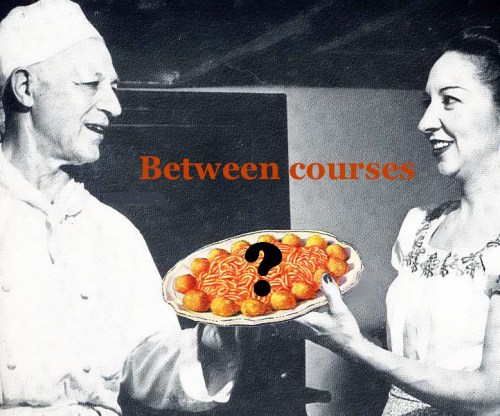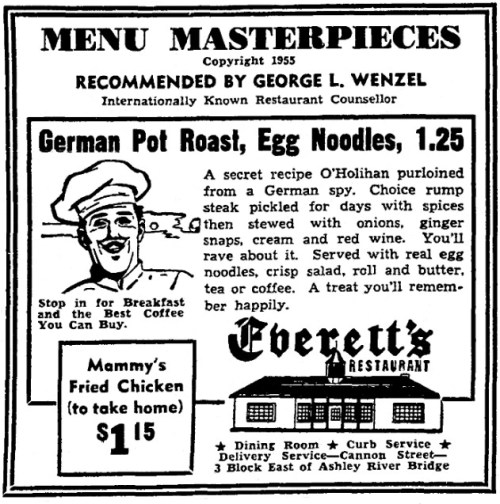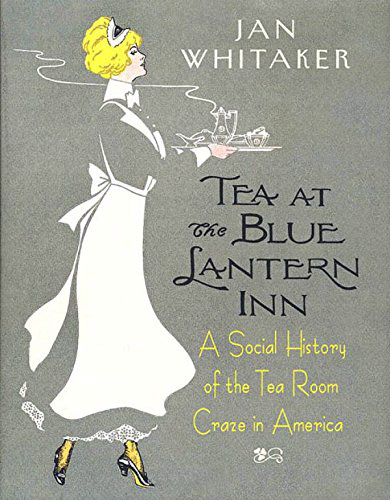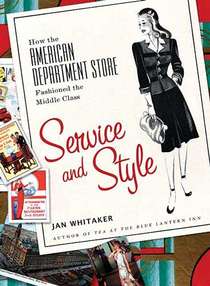Once again, what I thought would be a simple post has required a crash course in the unfamiliar, this time the technicalities of trade secrets, confidentiality agreements, lawsuits, and settlements.
 What I have learned is how complex the restaurant industry has become. A restaurateur’s simple claim to have one or more secret recipes, either from a revered family member or an “exotic” cuisine, has given way to extremes of self protection aimed at stemming not only competitive use of signature recipes but also their novel names, plating, and menu descriptions.
What I have learned is how complex the restaurant industry has become. A restaurateur’s simple claim to have one or more secret recipes, either from a revered family member or an “exotic” cuisine, has given way to extremes of self protection aimed at stemming not only competitive use of signature recipes but also their novel names, plating, and menu descriptions.
Around 1900 a secret recipe was little more than one that the restaurant declined to give out to customers. But now, in extreme cases, restaurants hire what could be called “simulacrum chefs” whose main role is to build the restaurant’s identity and give it celebrity chef chic. Often chefs must sign agreements to abandon their rights to the recipes they develop while in the restaurant’s hire.
This can lead to ugly confrontations down the road. As happened, for instance, in clashes between Chef Laurent Tourondel and Jimmy Haber, owner of the BLT string of restaurants. Haber called the restaurants’ recipes “work product” belonging to the company, that could not be used in the new restaurant Tourondel opened. In the case of “Chef Bee,” a Miami restaurant company, 50 Eggs, claimed that the chef, whose legal name is Piyarat Potha Arreeratn, refused to cook once the restaurant opened, then quit and took recipes and all he had learned during training back to his family-owned restaurant. In the suit, 50 Eggs made it sound as though the chef’s standing as well as “Thai street food” itself were their products.
Fast food chains were among the first to widely advertise their special recipes for “11 herbs and spices” and “secret sauces.” Given that, upscale restaurants today are less likely to advertise their secret recipes. (Besides, all their recipes may be secret.)
In earlier years it seemed that the real value of secret recipes lay in their advertising potency. Some restaurants went so far as to concoct silly stories about spies trying to buy their wonderful chili formula, or, in the case of Eberett’s in Charleston SC, how they obtained their homely-sounding recipe for pot roast from a German spy. In the 1980s, a New Orleans Chinese restaurant claimed its “Singapore Fried Chicken” was based on a secret recipe “from the Orient.”
 In the case of fast food, successful competition – to the extent it is based on food at all – depends upon a few products with “unique” tastes that can be produced faithfully over and over. The protection of secret recipes is essential and it seems clear that the recipes do not belong to the low-paid personnel who work on the assembly line.
In the case of fast food, successful competition – to the extent it is based on food at all – depends upon a few products with “unique” tastes that can be produced faithfully over and over. The protection of secret recipes is essential and it seems clear that the recipes do not belong to the low-paid personnel who work on the assembly line.
But fine – or trendy – restaurants, on the other hand, are expected to pioneer or at least keep up with the latest sensations. Yet the chef who develops the recipes often must leave them behind. Citing “the restaurateur’s dilemma,” bloggers Denise M. Mingrone and Roland Chang asked in 2014: “Doesn’t society benefit from allowing chefs . . . to create culinary delights and publish their recipes without fear of legal reprisal?”
It is scarcely surprising that some chefs refuse to accept positions that require them to surrender ownership of recipes they develop, or that they aspire to open their own restaurants where they can be autonomous “chiefs.”
Meanwhile,“Nondisclosure and noncompete agreements in employment contracts have become increasingly popular in the restaurant industry,” noted Sarah Segal in “Keeping It in the Kitchen” in 2016.
© Jan Whitaker, 2017














 It's great to hear from readers and I take time to answer queries. I can't always find what you are looking for, but I do appreciate getting thank yous no matter what the outcome.
It's great to hear from readers and I take time to answer queries. I can't always find what you are looking for, but I do appreciate getting thank yous no matter what the outcome.


